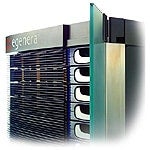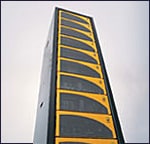A provider of utility computing hooked up with a utility storage outfit Tuesday to create a combination that could compete more strongly with offerings from vendors such as IBM , VERITAS Software
, or EMC
.
Utility computing provider Egenera joined forces with utility storage specialist 3PAR in a comprehensive server and storage virtualization offering for the utility data center.
The two partners also announced a joint customer — Matsushita Electric Works Information Systems, a major Japanese systems integration and outsourcing service provider — in addition to their technology, marketing, and support relationship.

Egenera BladeFrame
Marlborough, Mass.-based Egenera is a blade server
.Fremont, Calif.-based 3PAR offers a combination of software, hardware, and services to help customers consolidate storage and reduce total costs in an approach that parallels what VERITAS and EMC are trying to accomplish.
Egenera will bundle its BladeFrame combination of blade server technology and virtualization software, which allows data centers to “run any application, on any resource, at any time, automatically,” with 3PAR’s InServ Storage Servers and virtualization software.
A key ingredient of utility computing, virtualization
allows IT managers to pool computing resources, sometimes rendering multiple instances of an operating system in one server.
3PAR InServ Storage Server
In the utility model, which analysts call both promising and unclear at turns, computing is generally piped on demand, as opposed to big machines taking up space — but that are perhaps not being used enough — in data centers.This approach allows IT departments to deploy new applications to rebalance infrastructure across applications and to provision resources on a pooled basis using granular increments.
The financing model is also usually handled in increments, or some type of metered billing arrangement akin to the way electric companies charge for power.
Egenera and 3PAR said in a statement they have completed a significant deployment with Matsushita, which owns and manages a large data center loaded with global high-speed networks that link more than 2,200 sites in Japan and overseas.
Matsushita is using the hardware, software, and services of Egenera and 3PAR to manage that data center as a utility computing environment to pipe application services for product design, ERP
, supply chain management , and CRM applications to its customers. Egenera Founder and CTO Vern Brownell said in a company statement that utility computing is “hot” now because it gives customers what they’re looking for.
“Between Y2K and the tech bubble, data centers are packed to the rafters with under-utilized platforms rigidly tied to specific applications,” says Brownell.
He notes that a combo of BladeFrame and 3PAR InServ systems will help customers align IT resources with business processes to lower costs and improve responsiveness.
Story courtesy of Internet News.
Back to Enterprise Storage Forum



